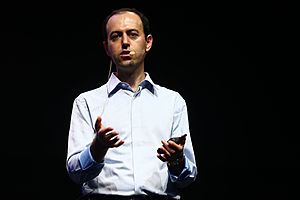Caucher Birkar facts for kids
Quick facts for kids
Caucher Birkar
کۆچەر بیرکار |
|
|---|---|
 |
|
| Born |
Fereydoun Derakhshani
1978 (age 47–48) Marivan County, Iran
|
| Citizenship | Iran |
| Alma mater | University of Tehran (BSc) University of Nottingham (PhD) |
| Children | 1 |
| Awards | Leverhulme Prize (2010) Moore Prize (2016) Fields Medal (2018) |
| Scientific career | |
| Fields |
|
| Institutions | Tsinghua University University of Cambridge |
| Thesis | Topics in Modern Algebraic Geometry (2004) |
| Doctoral advisor |
|
Caucher Birkar is a brilliant mathematician who was born in Iran and now lives in the UK. He is a professor at Tsinghua University in China. His original name was Fereydoun Derakhshani, and he was born in July 1978.
Birkar is known for his important work in a field of mathematics called birational geometry. This area of math studies shapes and spaces using algebra. In 2010, he won the Leverhulme Prize for his contributions to algebraic geometry, which is about solving equations using geometric shapes.
He also received the AMS Moore Prize in 2016. In 2018, he was awarded the Fields Medal, which is like the Nobel Prize for mathematics. He earned this award for his discoveries about special shapes called Fano varieties and his work on the minimal model program. This program helps mathematicians understand complex geometric shapes better.
Caucher Birkar has a strong connection to his Kurdish background. He encourages Kurdish identity but keeps it separate from politics. His chosen name, Caucher Birkar, means "the Migrating Mathematician" in Kurdish.
Early Life and Education
Where Did Caucher Birkar Grow Up?
Caucher Birkar is a Kurd. He was born in 1978 in Marivan County, Kurdistan province, Iran. His family lived on a farm where they grew their own food to survive. He grew up during the Iran-Iraq War, a difficult time.
He was one of six children. He learned a lot about math from his older brothers when he was young. After finishing high school, he went to the University of Tehran to study mathematics. He earned his bachelor's degree there.
How Did He Become a Refugee?
In 2000, Birkar won third prize in the International Mathematics Competition for University Students. Soon after, while still a student, he moved to the UK. He sought political asylum, which means he asked the government for protection as a refugee.
From 2001 to 2004, Birkar studied for his PhD at the University of Nottingham. In 2003, he received the Cecil King Travel Scholarship. This award is given to promising PhD students by the London Mathematical Society. After moving to the UK, he changed his name to Caucher Birkar. This name means "migrant mathematician" in the Kurdish language.
Research and Career
What is Birational Geometry?
Caucher Birkar is a leading expert in birational geometry. This is a complex area of mathematics that studies how different geometric shapes can be transformed into each other. It's like finding ways to change one shape into another while keeping some of its basic properties.
Working with other mathematicians like Paolo Cascini, Christopher Hacon, and James McKernan, Birkar helped solve several big math problems. These included proving the existence of "log flips" and showing that certain mathematical structures called "log canonical rings" are finite. They also proved that "minimal models" exist for certain types of shapes. Their work built on earlier research by Vyacheslav Shokurov and Hacon and McKernan.
What Are Log Canonical Singularities?
Birkar also worked on "log canonical singularities." These are specific points or features on geometric shapes that mathematicians study. He proved that "log flips" exist in this area. He also helped solve important parts of the "minimal model" and "abundance conjectures." These are major ideas in algebraic geometry.
How Did He Study Iitaka's Problem?
In another area of his research, Birkar looked at an old problem from a mathematician named Iitaka. This problem is about how certain mathematical systems behave on shapes with "non-negative Kodaira dimension." Birkar and another mathematician, Zhang, solved half of this problem. Their work helped simplify Iitaka's problem, making it easier to understand.
What Are Fano Varieties?
More recently, Birkar has focused on Fano varieties and the special features of "linear systems." He has solved several important problems in this field. These include Shokurov's idea about the "boundedness of complements" and the Borisov–Alexeev–Borisov conjecture about the "boundedness of Fano varieties."
In 2018, Birkar received the Fields Medal for his work on Fano varieties and his other contributions to the minimal model program. He hoped that his Fields Medal would bring "just a little smile" to the faces of the world's estimated 40 million Kurds.
What Happened to His Fields Medal?
Interestingly, Birkar's Fields Medal was stolen on the very day he received it! However, he was given a replacement medal at a special ceremony. This led to jokes that he was the first person to receive the Fields Medal twice.
Birkar also works on birational geometry in different mathematical settings. His work, along with that of Hacon and Xu, has almost completed the minimal model program for certain 3D shapes.
Awards and Honours
What Awards Has Caucher Birkar Won?
Caucher Birkar has received many important awards for his mathematical work:
- 2010: Leverhulme Prize in mathematics and statistics. This was for his "outstanding contributions to fundamental research in algebraic geometry."
- 2010: Prize of the Fondation Sciences Mathématiques de Paris.
- 2016: AMS Moore Prize.
- 2018: Fields Medal.
- 2019: Honorary Doctorate from Salahaddin University in Erbil.
 | Delilah Pierce |
 | Gordon Parks |
 | Augusta Savage |
 | Charles Ethan Porter |

